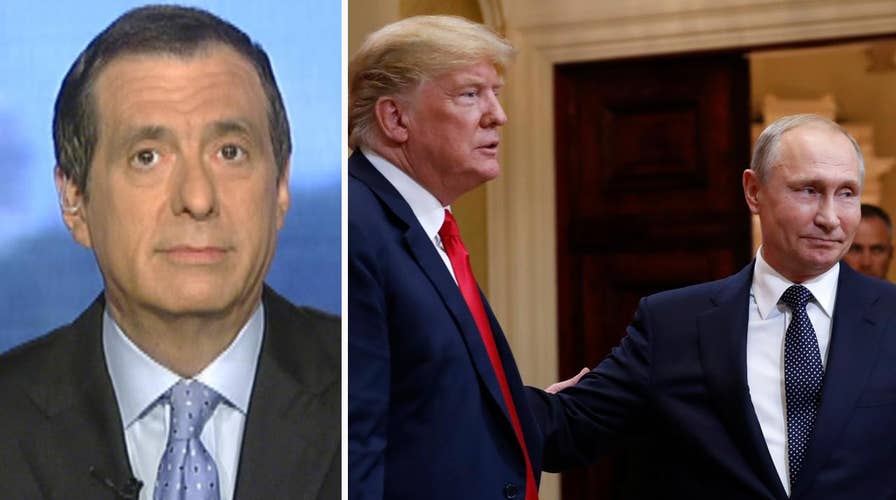Kurtz: Conservatives join liberal critics on Trump, Putin
'MediaBuzz' host Howard Kurtz weighs in on the bipartisan criticism following President Trump and Putin's bilateral meeting in Finland.
President Trump gave his detractors plenty of ammunition while standing beside Vladimir Putin.
At yesterday's Helsinki press conference, Trump refused to side with the findings of his own intelligence community that Putin's government used illegal hacking to influence the election. Instead, he said, "I don’t see why it would be" Russia, and contrasted that with Putin's "extremely strong and powerful" denial.
He then pivoted to "Hillary Clinton's emails," the server and the fact that he beat her in the election.
In a strange way, Putin seemed to take the indictment of 12 Russian military officers more seriously, saying he'd look into having his country's law enforcement cooperate with the Robert Mueller probe (though I wouldn't hold my breath).
With 1,400 journalists on hand, it was a moment that ricocheted around the world. While we might have expected Trump to be diplomatic about the Russian hacking, he seemed to give as much if not more weight to the predictable denials of the former KGB agent than to his own CIA and Justice Department. Not to mention Trump's national intelligence chief, Dan Coats, who calls the Russian disruption efforts "ongoing" and "pervasive."
But—and this seems to come up whenever I write about the 45th president—some in the media and commentary world engaged in extreme rhetoric as well.
MSNBC contributor John Brennan, Barack Obama's CIA director, called Trump’s performance "nothing short of treasonous" and said Mike Pompeo, John Bolton and John Kelly should resign. The normally sober David Axelrod of CNN likened Trump to Neville Chamberlain after his infamous meeting with Hitler. MSNBC analyst Jonathan Alter called for Congress to censure Trump. MSNBC's John Heilemann called it "a historic and comprehensive self-befoulment" by Trump.
CNN anchor Anderson Cooper called the presser "perhaps one of the most disgraceful performances by an American president at a summit in front of a Russian leader, that I have ever seen." Another CNN anchor, John King, called it “the surrender summit.”
At the same time, some on the right also went off on the president. Paul Ryan and Mitch McConnell both distanced themselves by saying they believe the administration's findings on Russian hacking.
On Fox News, anchor Neil Cavuto said Putin "appeared to run circles around the president and get him to buy ... every single sneaky lie and misstatement he has made on this matter."
Fox Business anchor Trish Regan said: "He should have defended us! He should have defended his own intelligence community. Or just don't take the meeting!" Retired Gen. Jack Keane, a Fox contributor, told Regan that Trump "walked away from his intelligence community and did not stand behind them when they absolutely have the goods on Putin’s meddling in our election."
National Review and The Weekly Standard ran tough pieces, and Trump ally and Fox contributor Newt Gingrich tweeted "it is the most serious mistake of his presidency and must be corrected—immediately."
So Trump can't just blame the "liberal media."
When you tick off both sides like that, you've got a serious political problem.
Now the media were not exactly neutral about the Helsinki summit to begin with.
The New York Times lead story on Monday morning: "Just Sitting Down With Trump, Putin Comes Out Ahead."
The Washington Post analysis: "Trump Can’t Beat Putin At His Own Game."
I understand what they were getting at. Since Trump spent the previous week at odds with NATO leaders, and refraining from criticizing Putin, he is helping to undermine the western alliance, just as the Russian strongman wants.
According to this view, by granting the summit, Trump is welcoming Putin back to the family of nations, after the global sanctions that followed its annexation of Crimea. (Not to mention Trump's own expulsion of 60 Russian diplomats after Moscow allegedly poisoned a former spy living in the U.K.).
What's more, this critique says that Trump is elevating Putin on the world stage because his country's gross national product is no larger than that of Texas.
But really, what's the alternative? To refuse to ever meet with the president of Russia, which has the second-largest arsenal of nuclear weapons?
During the worst tensions of the Cold War against the Soviet Union, American presidents met with Khruschev, Brezhnev and Gorbachev. The issue is not the mere fact of the meeting but what if any results the Putin session yields.
No one had any expectations for this get-together other than vague promises of future cooperation. All Trump needed to do was get by the press conference unscathed. Instead, he unleashed waves of condemnation, even from some nominal allies, that won't be receding anytime soon.













































